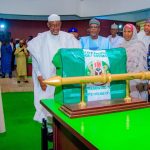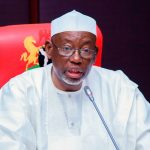Gov. Umar Namadi of Jigawa has presented a ₦901.8 billion Appropriation Bill for the 2026 fiscal year, proposing a significant expansion of capital investments across key sectors of the state.
The governor made the presentation on Wednesday before the Jigawa State House of Assembly in Dutse.
A statement issued by Mr Hamisu Mohammed Gumel, Chief Press Secretary to the Governor, said the proposal represents a 19.2 per cent increase over the 2025 budget of ₦756.3 billion.
According to the statement, Namadi described the budget as “an ambitious yet achievable plan aimed at consolidating the progress already recorded and accelerating development across key sectors of the state’s economy.”
Gumel quoted the governor as saying that the budget is anchored on the state’s 12-Point Agenda and the newly approved Comprehensive Development Framework.
He said the budget revenue projection stands at ₦901.8 billion, expected to be sourced from statutory allocation (₦96.2bn), VAT (₦102bn), other federal transfers (₦223bn), Internally Generated Revenue (₦88.9bn), LEA and PHC reimbursements (₦42bn), and capital receipts (₦349.5bn).
The statement said the governor explained that the figures were “carefully considered and validated to ensure a realistic and credible financing framework for the budget.”
Namadi said the budget allocates ₦693.4 billion—representing 76.9 per cent of the total expenditure—to capital projects, while personnel costs will consume ₦120 billion.
Other recurrent provisions include ₦75.6 billion for overheads, ₦7 billion for contingency and stabilisation, and ₦5.7 billion for public debt charges.
On sectoral allocation, the statement said the economic sector received more than ₦396 billion.
These include ₦186.3 billion for roads and transport, ₦74.9 billion for agriculture and livestock, ₦50.7 billion for power and energy, ₦17.5 billion for commerce and investments, ₦17.4 billion for strategic investments, and ₦12.6 billion for youth empowerment.
Gumel said the governor stressed that the investments were designed to “enhance connectivity, boost productivity, facilitate energy reliability, expand market systems, and create jobs for the growing youth population.”
In the social sector, more than ₦236 billion was earmarked for education, health, women’s affairs, and related services.
Education received ₦48.2 billion for basic level, ₦52.3 billion for post-basic, and ₦38.6 billion for tertiary education.
Health sector allocations include ₦27.2 billion for the Ministry of Health and ₦20.1 billion for the Primary Health Care Development Agency.
Women’s affairs and social development received ₦13.9 billion, while Information, Youth, Culture and Sports got ₦2.8 billion.
The governor noted that combined education and health spending exceeds ₦310 billion, underscoring the administration’s commitment to human capital development.
He also highlighted allocations for water supply, environment and climate resilience, and urban development: ₦25.4 billion for water supply and sanitation, ₦35.4 billion for environmental protection, ₦7.9 billion for land, housing and urban development, and ₦2.3 billion for local governance and community development.
“These investments will support access to clean water, erosion control programmes, climate-risk mitigation, and improvements in regional and urban planning,” the statement added.
The governor also presented the consolidated 2026 budget of the 27 local government councils amounting to ₦288.8 billion, out of which ₦68.8 billion is for personnel costs, ₦74.2 billion for overheads, ₦8.1 billion for contingency, and ₦137.6 billion for capital expenditure.





